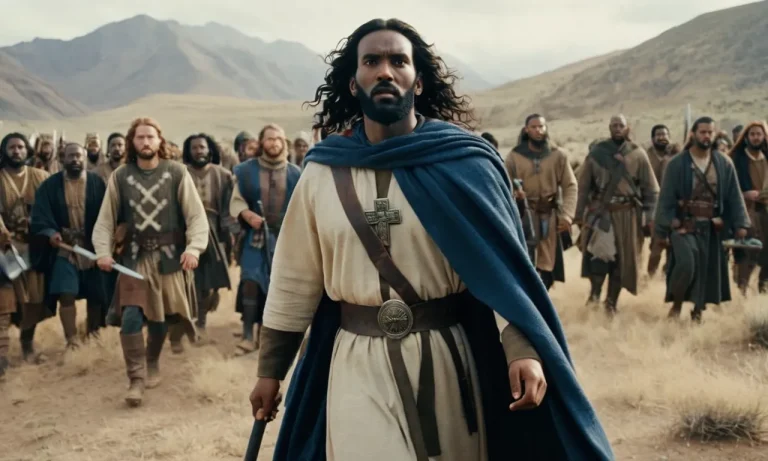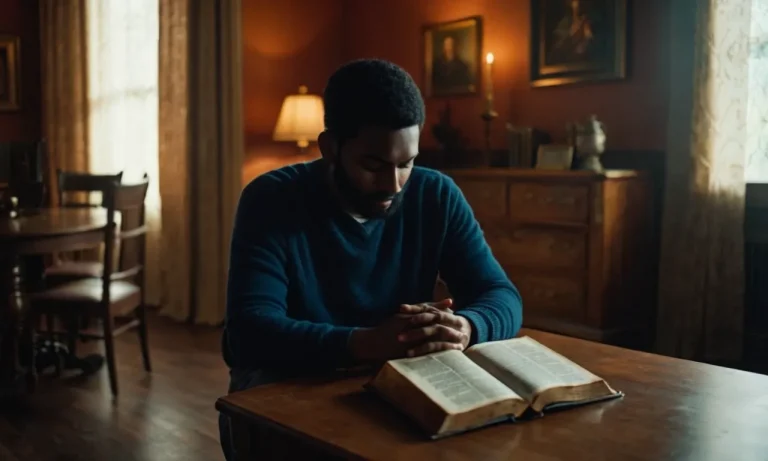The Overarching Story Of The Bible
The Bible tells the captivating story of God’s redemptive plan for humanity through Jesus Christ. Spanning 66 books and over 40 authors, the Bible weaves an intricate tapestry that reveals God’s character and His desire to be in relationship with people.
If you’re short on time, here’s a quick answer: The overarching story of the Bible, also called the metanarrative, is the tale of God’s plan to redeem and restore humanity and all of creation through Jesus’ life, death on the cross, and resurrection from the dead.
In this comprehensive guide, we will trace the Bible’s grand narrative from creation to the ultimate restoration of paradise, examining major themes and events along the way. With clarity and insight, we’ll see how the entire Bible points to Jesus Christ as the fulfillment of God’s promises.
God’s Original Plan: Creation
The goodness of God’s creation
According to Scripture, after each day of creation, God saw that “it was good” (Genesis 1:4, 10, 12, 18, 21, 25). This repeating refrain emphasizes the inherent goodness and value of all that God made in the beginning, from light and dark, sky and seas, land and vegetation, sun and moon, creatures of water and air, animals and humans.
God purposefully created a world suffused with beauty, complexity, variety and order—all which reflect His divine nature (Psalm 19:1).
Humans made in God’s image
The pinnacle of creation was humankind, whom Scripture says God crafted in His own “image” and “likeness” (Genesis 1:26-27). To bear God’s image means humans have sacred value, are relational beings capable of knowing and loving God, and are appointed as His representatives to govern creation justly and compassionately.
God prepared the idyllic Garden of Eden to be the perfect home for Adam and Eve, lavishing them with His love and friendship as they walked in intimacy with Him (Genesis 2:8, 3:8).
God’s intention for intimate relationship
From the beginning, God’s intention has been to dwell in close relationship with humans. Scripture compares this ideal relationship to a groom’s tender love for his bride (Isaiah 54:5-8). Tragically, Adam and Eve’s rebellion against God’s loving commands broke humanity’s intimacy with their Creator (Genesis 3).
Yet God continued reaching out to people in love—through Noah, Abraham, Moses and the prophets—inviting them over and over into restored relationship. God’s ultimate act of reconciliation was sending Jesus to rescue fallen humanity through His atoning sacrifice, making possible an eternal loving bond between God and all who place their trust in Christ (John 3:16; Ephesians 1:4-5).
The Fall: Adam and Eve’s Disobedience
Temptation by the serpent
In the Garden of Eden, the serpent tempted Eve to eat the forbidden fruit from the tree of knowledge of good and evil. The serpent tricked Eve by telling her that if she ate the fruit, she would not die as God said, but would become like God, knowing good and evil (Genesis 3:5).
Against God’s command, Eve believed the serpent and ate the fruit. She then gave some to Adam, who also ate it.
Consequences of the Fall
Eating the forbidden fruit had drastic consequences. Adam and Eve’s eyes were opened to their nakedness, and they hid from God out of shame and fear. God confronted them about their disobedience, cursing the serpent, the ground, and pronouncing pain and struggle in childbirth for Eve.
Most tragically, the intimate relationship between God and humans was broken. Sin and death entered the world. Adam and Eve were banished from the garden, unable to eat from the tree of life. Humankind inherited a sinful nature from Adam and Eve, predisposed to rebel against God.
The Fall illustrates that evil did not originate with God but through human disobedience. It highlights the severe consequences of sin. Humans thought they could become like God by taking things into their own hands apart from God’s will.
God’s promise of redemption
Yet even after the Fall, God showed mercy. He promised Eve her offspring would crush the serpent’s head (Genesis 3:15), foreshadowing Christ’s redemption. God did not leave humans in their state of rebellion but provided a way to restore the broken relationship.
Throughout the Old Testament, God established covenants with Noah, Abraham, Moses, and David, promising salvation. God’s holiness and justice require judgment for sin, but in love, He provided the means of redemption in Christ.
The overarching narrative moves from creation to Fall to redemption. Despite human failure, God faithfully enacted His plan to save and restore humanity to Himself. God did not abandon His creation but sent Jesus, the offspring of Eve, to conquer the enemy, reverse the curse, forgive sins, and enable us to know God once again.
God’s Covenant Promises to Abraham
The call of Abraham
God called Abraham (originally named Abram) to leave his country and people and go to a land that God would show him (Genesis 12:1-3). This was a bold request, as it required Abraham to put his complete trust in God’s promise. Yet Abraham obeyed, demonstrating great faith.
God then made a special covenant with Abraham, promising to bless him and make him into a great nation, through which all peoples on earth would be blessed. This set the foundation for the overarching story of the Bible.
God’s covenant blessings
God made incredible promises to Abraham as part of the covenant (Genesis 12:2-3, 15:5). These included:
- Making Abraham into a great nation
- Blessing those who blessed him and cursing those who cursed him
- Blessing all peoples on earth through Abraham
These were amazing promises that must have seemed unbelievable to Abraham at the time. Yet he trusted in God’s faithfulness. God then reiterated the covenant with Abraham’s son Isaac and grandson Jacob (Genesis 26:2-5, 28:13-15).
A land and descendants for Abraham
God also made very specific promises to Abraham about the land and descendants he would be given.
Regarding descendants, God miraculously enabled Abraham and his wife Sarah to have a son in their old age, named Isaac (Genesis 21:1-7). God later promised Abraham that his descendants would be as numerous as the stars in the sky (Genesis 15:5).
This promise was ultimately fulfilled through the formation of the nation of Israel, descended from Abraham’s grandson Jacob.
In terms of land, God promised to give the land of Canaan to Abraham and his offspring as an “everlasting possession” (Genesis 17:8). This promise was partially fulfilled as the Israelites took possession of Canaan in the time of Joshua.
But the complete fulfillment awaits Christ’s second coming, when all of redeemed humanity will dwell eternally in the new heavens and new earth.
So while Abraham did not see the complete fulfillment of these promises in his lifetime, God demonstrated His faithfulness by beginning to fulfill them. And the later books of the Bible show how God continues to work out these covenant promises to Abraham and his descendants across history.
Truly an incredible overarching story!
The Giving of the Mosaic Law
After the dramatic liberation of the Israelites from slavery in Egypt through God’s mighty acts, Moses ascended Mount Sinai to meet with God. There, God gave Moses the Law that would guide Israel’s religious, ethical and civil life as God’s chosen nation.
Liberation from slavery in Egypt
The Exodus story describes how God freed Israel from brutal slavery under the Pharaoh in Egypt. Through 10 devastating plagues, God flexed His muscles over the Egyptian gods and demonstrated His supremacy. The final plague, the death of the firstborn sons, led to Israel’s emancipation.
This became the defining narrative of God’s love and care for His people.
The 10 Commandments
At Mount Sinai, God gave Moses the 10 Commandments, which formed the foundation of Israel’s covenant relationship with God. These laws provided moral and ethical guidelines for God’s people and are still relevant today.
The first few commandments focused on loving God fully while the last emphasized love for fellow humans by not stealing, murdering or coveting.
Laws for religious and civil life
In addition to the 10 Commandments, God gave Moses extensive laws spanning Israel’s civic, ceremonial and moral life. These covered everything from property rights, food regulations, tithing, sin offerings, Sabbath practices, dietary restrictions, clothing materials, just trials, capital punishment, slavery guidelines, and more.
They revealed God’s high standards for living and worship.
The Kingdom of Israel
Israel united under Kings David and Solomon
After the period of the Judges, Israel united under the leadership of Saul, David, and Solomon. King David established Jerusalem as the capital and brought the Ark of the Covenant there. His son Solomon built the first temple, indicating God’s presence with His people.
As it says in 1 Kings 8:10-13, “When the priests withdrew from the Holy Place, the cloud filled the temple of the Lord. And the priests could not perform their service because of the cloud, for the glory of the Lord filled his temple.” This was the peak era for the kingdom of Israel.
The temple and the presence of God
The temple Solomon built housed the Ark of the Covenant, which represented God’s presence. Israelites would make pilgrimages there to offer sacrifices and worship God. As it says in 2 Chronicles 7:1-3, “When Solomon finished praying, fire came down from heaven and consumed the burnt offering and the sacrifices, and the glory of the Lord filled the temple.
The priests could not enter the temple of the Lord because the glory of the Lord filled it. When all the Israelites saw the fire coming down and the glory of the Lord above the temple, they knelt on the pavement with their faces to the ground, and they worshiped and gave thanks to the Lord.”
This showed God’s approval of the temple and his presence with His people.
Israel’s disobedience and exile
Sadly, following Solomon’s death, Israel split into two kingdoms and began disobeying God. As punishment, God allowed the Assyrians to conquer Israel in 722 BC and the Babylonians to conquer Judah in 586 BC. Most Jews were exiled from the Promised Land.
However, prophets like Jeremiah and Ezekiel encouraged the people with promises of future restoration. As Jeremiah 29:10-14 says, “When seventy years are completed for Babylon, I will come to you and fulfill my good promise to bring you back to this place.
For I know the plans I have for you…plans to prosper you and not to harm you, plans to give you hope and a future.” Despite their disobedience, God still loved His people and had future plans to restore them.
The Life and Ministry of Jesus Christ
Old Testament prophecies fulfilled
Jesus fulfilled over 300 prophecies from the Old Testament during His life, ministry, death and resurrection, including being born in Bethlehem (Micah 5:2), entering Jerusalem riding a donkey (Zechariah 9:9), being betrayed for 30 pieces of silver (Zechariah 11:12), and having His hands and feet pierced (Psalm 22:16).
These and other specific prophecies written hundreds of years before His birth validate Jesus as the long-awaited Messiah.
Teachings, miracles, death and resurrection
During His three-year ministry, Jesus taught profoundly about God’s kingdom, performed many awe-inspiring miracles over nature, sickness and death, was crucified to pay for the sins of mankind, and rose from the dead three days later.
His teachings focused on loving God and loving people (Matthew 22:37-39), and introduced revolutionary concepts like loving enemies (Matthew 5:44) and humility (Matthew 20:26). Through His words and actions, Jesus demonstrated God’s character and heart like no one ever had.
The gospel of the kingdom of God
The central message Jesus proclaimed was the arrival of God’s kingdom on earth (Matthew 4:17), where those who repent and believe would begin experiencing abundant, eternal life (John 10:10). This aligned with Old Testament hopes (Isaiah 9:6-7), which Jesus came to fulfill (Luke 24:44).
After His resurrection, He commissioned His followers to spread His kingdom message globally (Acts 1:8), that all may be reconciled to God by trusting in Christ’s finished work.
Jesus’ life and ministry left an undeniable, world-changing legacy. Though rejected by religious leaders and killed by political rulers (Acts 4:27), His resurrection declared Him Lord and Messiah (Romans 1:4), eventually turning the world upside down (Acts 17:6).
Today, around one-third of the global population identifies as Christian, making Jesus the most significant person to ever walk the earth.
The Early Church and Spread of the Gospel
Pentecost and the gift of the Holy Spirit
After Jesus ascended to heaven, his disciples waited in Jerusalem for the gift he promised them – the Holy Spirit. On the day of Pentecost, while the believers were gathered together, the Holy Spirit descended on them like tongues of fire.
Empowered by the Spirit, the disciples began proclaiming the gospel in many languages. Through Peter’s preaching alone, over 3,000 people believed in Jesus and were baptized that day. The gift of the Holy Spirit allowed the early church to grow rapidly.
Expansion despite persecution
Though the church expanded quickly, the disciples also faced intense persecution for their faith. Stephen was stoned to death after powerfully proclaiming the gospel. Saul of Tarsus relentlessly persecuted Christians until his dramatic conversion on the road to Damascus.
Herod Agrippa killed James and imprisoned Peter. Despite the persecution, the church continued to grow, and the gospel spread beyond Jerusalem into Judea, Samaria and the ends of the earth. The blood of the martyrs proved to be the seed of the church.
Paul’s missionary journeys
The Apostle Paul played a vital role in the spread of early Christianity. He went on three extensive missionary journeys to proclaim the gospel and plant churches throughout Asia Minor and Greece. On his first journey, Paul established churches in cities like Antioch, Iconium, Lystra and Derbe before returning to Antioch.
On his second journey, Paul strengthened the churches he had planted and expanded west into Macedonia and Achaia. On his third journey, Paul ministered in Ephesus for three years before returning to Jerusalem. Through his missionary work, Paul helped spread the gospel widely across the Roman Empire.
The Fulfillment of God’s Plan
Jesus returns to restore all things
According to the Bible, Jesus Christ will return to earth one day to fulfill God’s plan of restoring all things. This is an amazing truth that gives believers hope. When Jesus returns, He will renew the world and make everything perfect again. Evil, sin, sickness, and death will be abolished.
There will be no more tears or pain. The creation itself will be liberated from its bondage and decay into the freedom and glory of God’s children (Romans 8:21).
The Bible says that no one knows the day or hour when Jesus will return, but He gave us signs to watch for that would indicate His coming is near (Matthew 24:36, 42-44). These include wars, famines, earthquakes, persecution of Christians, apostasy, and more.
As we see these signs increasing in frequency and intensity in the world, we can know that Jesus’ return is drawing closer.
Final judgment and redemption
When Jesus returns, there will be a final judgment where every person will give an account before God (2 Corinthians 5:10). Believers in Christ will be saved while those who rejected God’s salvation will be condemned (Revelation 20:11-15).
This judgment is necessary because God is perfectly holy and just – He cannot allow sin and rebellion in His presence. But God is also rich in mercy, which He demonstrated by sending Jesus to die for our sins so we could be forgiven and redeemed (Ephesians 2:4-5).
For believers, the return of Christ brings redemption and reward rather than judgment and condemnation.
They will receive new resurrection bodies free from sin, pain, and death (1 Corinthians 15:51-57). Their works and service for Christ will be tested by fire to determine heavenly rewards (1 Corinthians 3:11-15). There will be much rejoicing as God’s people are finally freed from all oppression, receive their full inheritance, and see their faith become sight.
Eternal life in the new creation
The Bible’s overarching story describes God’s plan to redeem humanity and restore His creation. This plan culminates with Jesus’ return when He will usher in the new heavens and new earth
(2 Peter 3:13). This is the eternal state where God dwells with His people (Revelation 21:3). There will be no more sin, evil, pain, suffering, or death – all will be made new. The nations and kings of the earth will come into the new Jerusalem.
Its gates will never be shut because there will be no more night (Revelation 21:24-25).
For believers, this new creation will be a glorious Inheritance where they will see God face to face. They will live in resurrection bodies and reign with Christ forever (Revelation 22:5). The tree of life will be there for the healing of the nations (Revelation 22:2). The curse of toil and death from Eden will be gone.
Eternal life in God’s new creation is the ultimate fulfillment of His redemptive plan for humanity and all creation.
We eagerly anticipate the glorious day when Jesus returns and God makes all things new. Come Lord Jesus! (Revelation 22:20)
Conclusion
Far from a disjointed collection of texts, the Bible reveals an integrated epic with Jesus at the center. From promising a redeemer in Genesis to depicting the new heavens and new earth in Revelation, Scripture showcases God’s magnificent mission to ransom people from every tribe and tongue to worship Him forever.
Through tracing the Bible’s metanarrative, we clearly see God moving human history toward His complete restoration of paradise lost. And as His story intersects with our individual stories, we can discover meaning, purpose and profound hope through faith in Christ, the hero of Scripture and rescuer of the world.








